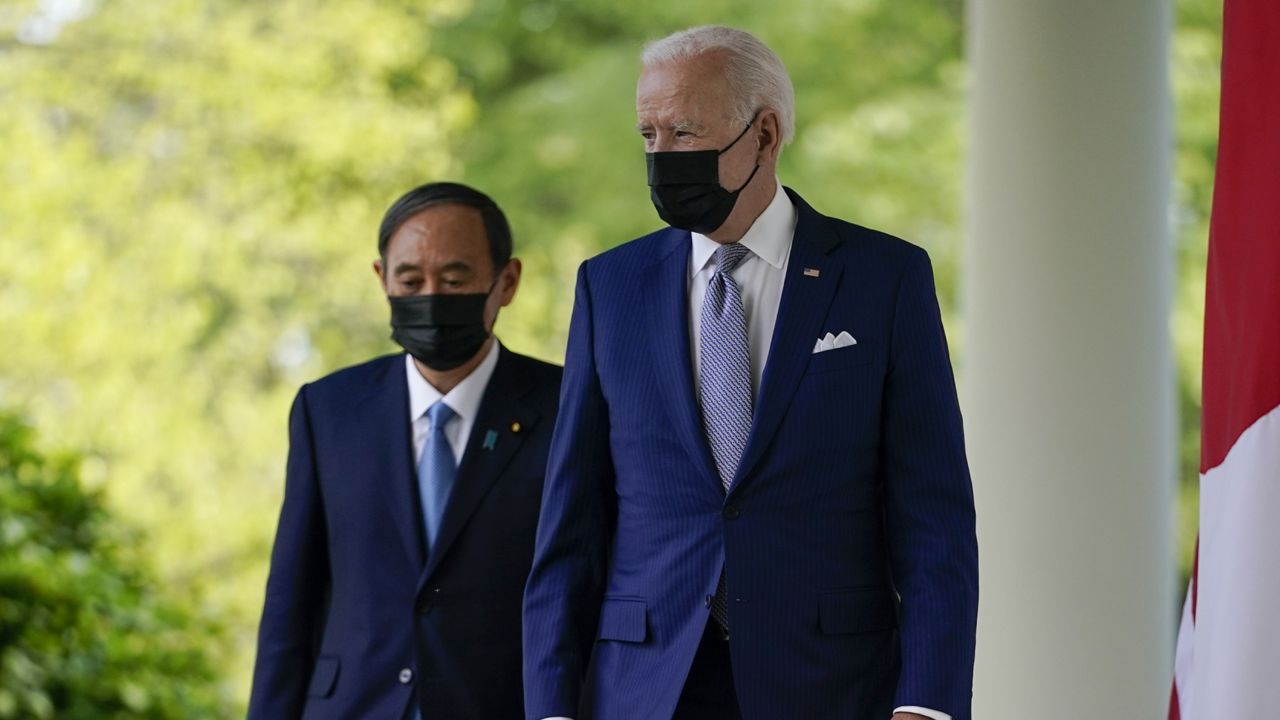President Joe Biden welcomed Japanese Prime Minister Yoshihide Suga to the White House on Friday, the president’s first in-person bilateral meeting with a foreign leader since taking office.
Ahead of a closed-door meeting, Biden told reporters cooperation between the two nations relies on "meeting the challenges facing our nations and ensuring the future of the region remains free and open,” adding that he was “looking forward” to speaking with Suga and his team on a range of issues.
Both Biden and Suga took questions in a subsequent press conference from the Rose Garden, with Biden saying the two “affirmed our ironclad support for the U.S. - Japanese alliance and for our shared security.”
“We committed to working together, to take on challenges from China and on issues like the East China Sea, the South China Sea, as well as North Korea, to ensure the future of a free and open Indo-Pacific,” he added.
The two leaders also announced the launch of a new strategiv partnership to “enhance our ability to meet the pressing challenges of our time,” primarily focusing on ending the pandemic and strengthening regional security.
“We’re also going to do more beyond this pandemic to advance longer term goals for health security in the form of the World Health Organization, and establishing a new partnership on health security to build better preparedness for the next pandemic, because there will be others,” Biden said.
The U.S. and Japan are both “deeply invested in innovation and looking to the future,” and will work together on technologies including 5G, manufacturing supply chains, and chips. The two countries are also committed to taking “aggressive action” on climate change. The two are set to release a joint statement further detailing their conversation by the end of the day.
Suga was also asked about the upcoming Tokyo Olympics, where the postponed games will open in just over three months and not be canceled despite surging COVID-19 cases in Japan.
"I told the president about my determination to realize the Tokyo Olympic and Paralympic Games this summer as a symbol of global unity," Suga said, adding: “President Biden once again expressed his support. Japan will continue careful and full preparation in order to realize the Tokyo games this summer, in order to ensure equitable access to vaccines for COVID-19.”
Earlier in the day, Prime Minister Suga participated in a wreath-laying ceremony at Arlington National Cemetery and also met with Vice President Kamala Harris. Both Suga and Harris acknowledged the significance of having the meeting in-person despite the pandemic.
"There is no other time than today when the Japan-U.S. alliance needs to be strong," the Japanese prime minister said. "This is an alliance that is connected by universal values such as freedom, democracy, and the rule of law."
In a briefing Thursday, White House Press Secretary Jen Psaki also announced an upcoming meeting with South Korean President Moon Jae-In, another U.S. ally in Asia, which is now set for the second half of May.
Psaki said China would be an important focus in both meetings, along with the U.S. desire for the denuclearization of North Korea.
"[It sends] a message about how vital and important the relationships in that region — the stability in the region, security in the region, economic partnerships in the region — are to this White House," Psaki said Friday.
Last month, Secretary of State Antony Blinken and Secretary of Defense Lloyd Austin traveled to both Tokyo, Japan and Seoul, South Korea to speak with foreign affairs and defense officials about U.S. and bilateral priorities in the region.
The Associated Press contributed to this report.



